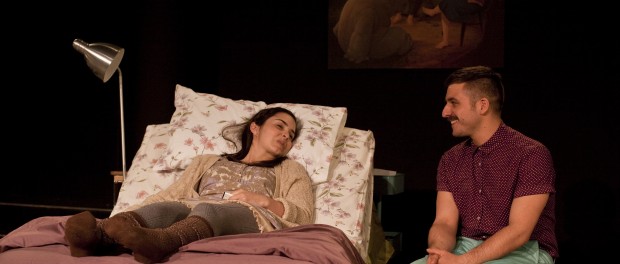Theatre Review of Bea: The quest for happiness may render us unfortunate
In Mick Gordon’s Bea, translated by Yannick Chapdelaine, we meet Bea, a girl with cerebral palsy just as a new caretaker enters her life to assist her single mother in caring for her. Olivia Palacci directs this production, currently showing at Théâtre Prospero, presented by le Théâtre de la bête humaine.
Upon entering the space, Bea (Alexandra Cyr) lies on a bed that the audience must almost approach to get to their seat. The still, seemingly unconscious body fosters the sentiments of a wake. A mounted television plays something in black and white. It is barely audible over the murmuring audience. A scream comes from the television, the audience calms to a dull roar, before resuming its discussions.
We are in the basement of the Theatre Prospero, in the ‘Salle Intime’, which directly translates to ‘Intimate Hall’. The audience is required to leave their coat upstairs as to not crowd the cozy space, which lends itself well to the experience. This particular space allows the audience to feel as though they are directly in Bea’s bedroom. The first row sits as close to the bed, if not closer, than the armchair set piece.
The stage manager takes her seat in the back corner behind us and all but the television goes to black. The last words uttered are “Brigitte Bardot” and the lights come up.
Stromae’s “Papaoutai” appropriately takes us into the play. A song that asks “Où est ton papa?” (“Where is your father?”), we learn early on that Bea’s father is no longer in the picture.
We meet Ray (Yannick Chapdelaine), Bea’s new caretaker, in the same moment she does. Upon meeting, she immediately word associates with his name, “Ray of sunshine, Ray of hope, Ray of light,” and makes a deal with him, while they are still strangers, to write a letter to her mother as she dictates. She asks for her mother’s help to free her from the prison that is her ill body. Her mother is severe, or as Bea describes her, “She needs love and empathy, just don’t expect it to be reciprocated.” The statements Bea uses to describe each character hold true throughout the narrative.
Bea’s mother, Catherine James (Suzanne Lantagne) tends to enter at the most inopportune moments, when situations can easily be taken out of context, creating superb comedic moments in an otherwise difficult narrative. Although the subject matter is heavy, there are many sweet, comedic moments.
Cyr takes on a demanding role in being required to maintain perfect stillness from the neck down unless moved by Lantagne or Chapdelaine for the whole two hours. Cyr’s clear presence enables her to act as the pillar that others must navigate around. She brings Bea to life and leads the audience to empathize with her easily. In a sense, she acts as a second audience. Although everything happens because of her, she does not actively move anything — she catalyzes.
Lantagne’s portrayal of the severe mother offers an evident contrast to Chapdelaine’s clownlike portrayal of caretaker Ray.
The costumes clearly exemplify each character. Although, Bea is not a child, she is dressed in a way that suggests youth, while her mother wears a dark suit, emphasizing her authoritative persona. Meanwhile, Ray, the only one with any real costume changes wears bright colours that help facilitate seeing him as the light-hearted “Ray of hope, Ray of sunshine”.
The play is not about the girl’s illness, but rather the girl’s freedom. Palacci does a wonderful job of expressing every individual’s right to love and experience beauty. And although it may be easy to begin living for someone else, it is never easy to keep living for someone else, and even more difficult to let go of that feeling.
Bea, by Mick Gordon, continues until May 16 at Théâtre Prospero (1371 Ontario E). Click HERE for tickets.






